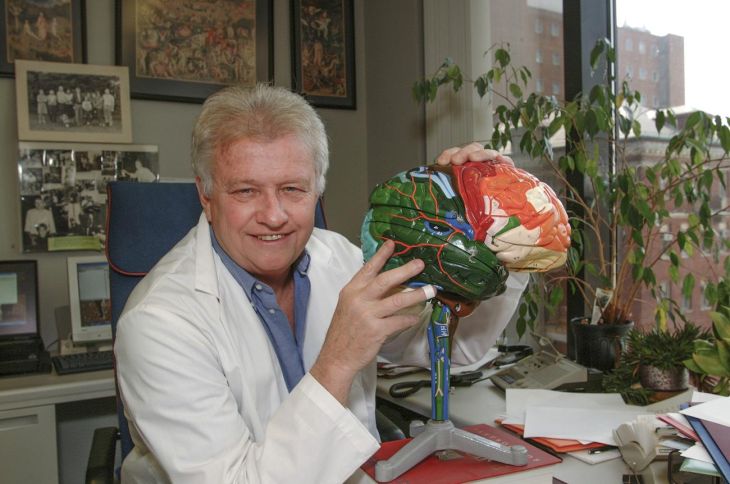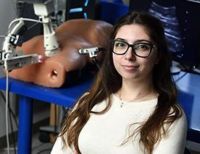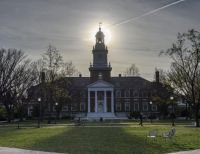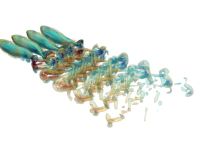Donald Lowell Price, a groundbreaking leader in neuroscience and the founding director of the Division of Neuropathology, the Brain Resource Center, and the Alzheimer's Disease Research Center at Johns Hopkins, died May 5 after a long illness. He was 87.
A pioneer in clinical and experimental neuropathology, Price was a much loved faculty member and mentor. In the 1980s, his laboratory made seminal contributions to the understanding of Alzheimer's disease and amyotrophic lateral sclerosis, or ALS. His research on naturally occurring animal diseases, in parallel to human neuropathologic studies, yielded important information about motor neuron disease.
In 1984, under Price's direction, the first donated brain was stored in the Johns Hopkins Hospital's pathology building. During the next decade, the center branched out and collected the brains of those who died with Huntington's disease, and in the 1990s, it began to store brains from people who died with Parkinson's and other neurodegenerative diseases. The center's collection grew even more when its work fused with that of the National Institute on Aging's Baltimore Longitudinal Study of Aging. The Brain Resource Center performs the neuropathology for all the study participants who are autopsied.
During Price's tenure at Johns Hopkins, his research impacted the fundamental understanding of the molecular basis and drivers of Alzheimer's and other neurodegenerative diseases and how the brain ages. Through his scientific insight, Price was instrumental in the development of donepezil, one of the most widely used drugs for treatment of Alzheimer's symptoms. He also developed, with his colleagues, animal models of these human disorders and integrated a deep understanding of pathology with mechanistic and therapeutic advances.
"As towering as his science was, probably his biggest impact and legacy was in education and training," says Ralph Hruban, director of pathology at the Johns Hopkins University School of Medicine. "Don trained hundreds of medical and graduate students, residents, and fellows, many of whom have gone on to illustrious careers in academics."
Ralph Hruban
Director of Pathology, School of Medicine
"As towering as his science was, probably his biggest impact and legacy was in education and training. Don trained hundreds of medical and graduate students, residents, and fellows, many of whom have gone on to illustrious careers in academics."
Born in Stamford, Connecticut, Price went to Wesleyan University for undergraduate training in English literature, and in 1961, graduated from Albany Medical School. He completed a neurology residency at Massachusetts General Hospital, and then was a staff neurologist (lieutenant commander) at the National Naval Medical Center in Bethesda, Maryland. He later returned to Boston for fellowship training and became an assistant professor of neuropathology at Harvard Medical School and director of neuropathology at Boston City Hospital.
In 1971, Price was recruited to Johns Hopkins, where he founded the Division of Neuropathology. He became a professor in 1978 and founded the Brain Resource Center the following year. In 1984, he founded the Johns Hopkins Alzheimer's Disease Research Center, which he led for three decades. In addition, Price played a critical role in founding the pathobiology graduate training program at Johns Hopkins.
Elected to the Institute of Medicine in 1998, he became president of the American Association of Neuropathologists in 1989 and the Society for Neuroscience in 2000.
Colleagues say Price's groundbreaking research, his teaching and his extraordinary mentoring laid a foundation for generations of pathologists to follow.
"As a mentor of junior faculty, Don has tremendously influenced and helped launch my scientific career here at Hopkins," says Philip Wong, professor of pathology and neuroscience.
Price's expertise was much in demand in national scientific circles, according to Juan Troncoso, current director of the Johns Hopkins Brain Resource Center.
"In addition to propelling him to an outstanding scientific career, Price's expertise in medicine, neurology, neuropathology, and cell biology gave him a unique perspective on research that made him a most sought after adviser to scientific societies, research foundations, the National Institutes of Health, U.S. Congress panels, and the scientific boards of pharmaceutical and biotechnology companies," Troncoso says.
The author of more than 500 research publications, Price received numerous awards, including the Soriano Award for Outstanding Contribution to Neuroscience, the Glenn Foundation Award, the Potamkin Prize for Alzheimer's Disease Research, the Alzheimer's Association International Conference's Lifetime Achievement Award in Alzheimer's Disease Research, and two Javits Neuroscience Investigator Merit awards.
After retiring in 2010, Price remained active as a professor emeritus of pathology, neurology, and neuroscience at Johns Hopkins. An avid swimmer, Price had a competitive spirit and ran races and triathlons. Due to his love of classic literature and music, scientific conversations with him easily strayed into discussions of Shakespeare or Dante, says Troncoso, noting that paper and grant reviews were often accompanied by the music of Wagner or Puccini.
"Our father was a strong believer in the importance of education," recalls his son, William L. Price, an emergency medicine physician. "He taught us, as well as all of the people he mentored, that you aren't just going through an education to learn something, but to learn how to educate oneself for life. He would offer to read all of his trainees' papers before submission. He would mark them up and then talk through the changes with them. As a result, he helped make everyone he mentored a better writer."
Price is survived by his loving wife of 67 years, Helen, their three children: William; Elaine Price-Schwartz, a pediatric ophthalmologist; and Donald L. Price Jr., a neurologist who completed a neuropathology fellowship; and eight grandchildren. A memorial service is planned at the Wilkerson Funeral Home in Greenville, North Carolina, and a celebration of life will take place at a later date at Johns Hopkins.
Posted in Health, Science+Technology
Tagged neuroscience, obituary







